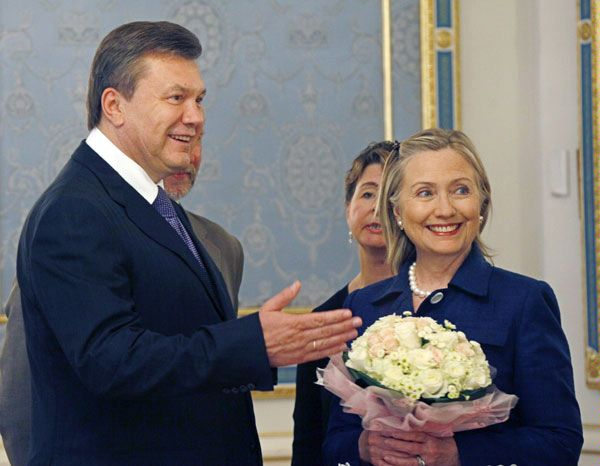
Hillary Clinton on Familiarization Visit to Ukraine
Publication: Eurasia Daily Monitor Volume: 7 Issue: 132
By:

US Secretary of State, Hillary Clinton’s, first visit to Ukraine on July 2, left the government satisfied, the opposition puzzled and many questions unanswered. On the one hand, no major statements were made or documents signed. On the other hand, thanks to Clinton’s visit, Ukraine and the International Monetary Fund (IMF) reached an agreement on a new large loan for the country after months of difficult talks. Clinton paid attention to the issue of the freedom of speech, which shows signs of deterioration under President, Viktor Yanukovych, but to the opposition’s dismay she abstained from any criticism. Clinton’s pragmatism could not but impress Yanukovych’s pragmatic team.
Clinton reiterated Washington’s praise for Yanukovych’s decision to abandon highly enriched uranium, which had helped Yanukovych to establish working relations with the Obama administration (EDM, April 21). She said Ukraine served as an example to other countries, which helped the non-proliferation cause (Ukraina TV, July 3). Clinton reacted calmly to the adoption by parliament of a new foreign policy doctrine which eliminates NATO membership from the list of Kyiv’s priorities. By a strange coincidence, this happened just hours before her arrival. Clinton said NATO’s doors would remain open, and it would be for Ukraine to decide what is best for its security (UNIAN, July 2).
Clinton signaled Washington’s readiness to cooperate on energy, saying that US companies should be interested in cooperation in nuclear energy, oil and gas extraction in the Black Sea and in shale gas projects (www.for-ua.com, July 5). The Yanukovych team will be grateful to Clinton for this signal to foreign investors. This was very important after a scandal with the US energy company Vanco, which the previous Ukrainian government in 2008 banned from developing hydrocarbon fields in the Black Sea.
Clinton also apparently sent an important signal to the IMF, pledging support for the Ukrainian government’s economic reform plans and urging the IMF and Ukraine to reach an agreement to help an economy emerging from crisis (Ukraina TV, July 3). The agreement was indeed reached immediately after Clinton’s departure on July 3, consequently Ukraine will receive a much-needed new $15 billion loan from the IMF which should help it stabilize national finances and attract investors. The loan will also prompt Yanukovych to speed up economic reform as this is the IMF’s main condition. Deputy Prime Minister, Serhy Tyhypko, who is responsible for reform and is the main negotiator with the IMF, said that Clinton’s visit had played a significant role in talks with the IMF (www.liga.net, July 6).
The opposition wanted Clinton to focus on the importance of freedom of speech and democracy in general as many fear Ukraine’s “Putinization” under Yanukovych. Former Prime Minister, Yulia Tymoshenko, told Clinton about “the establishment of an authoritarian regime,” “censorship,” and “repression against political opponents and total control of the judiciary” (Interfax-Ukraine, July 2). The police detained pro-democracy protestors ahead of Clinton’s meeting with local students. The demonstrators said they wanted to draw her attention to the reports of media censorship and “security chief, Valery Khoroshkovsky’s, attempts to shut down the TV channels TVi and 5 Kanal” (www.liga.net, July 3; EDM, June 24).
Clinton told the students that she discussed “the foundations of civil society” with Yanukovych and Foreign Minister, Kostyantyn Hryshchenko, and told them that democratic freedoms should be respected (UNIAN, June 3). However, Clinton pointedly abstained from criticism, which left the opposition dissatisfied and the authorities triumphant. Hryshchenko said that Washington had learned to “see the difference between reality and the emotions” of “those who during five years [in power] failed to secure either freedom of speech or democratic development” (Inter TV, July 2). Hryshchenko clearly referred to Yanukovych’s predecessor, Viktor Yushchenko, as well as Yulia Tymoshenko.
The popular pro-government daily, Segodnya, echoed Hryshchenko’s views: “Nowadays the US wants to deal with predictable and stable regimes which do not bring democratization to such extremes as permanent political crisis and civil war.” The newspaper opined that the current government is a “normal post-Soviet regime in Washington’s eyes.” The Kyiv-based Horshenin think-tank Director, Volodymyr Fesenko, suggested that “American foreign policy is pragmatic to the point of cynicism.” He added that the US does not want to upset Yanukovych by lecturing him on democracy, but it wants him to keep his promise on uranium and maintain strategic partnership with Kyiv (Segodnya, July 4).
Yushchenko’s former advisor, Vadym Karasyov, suggested that Washington abstains from criticizing Yanukovych, fearing that otherwise Kyiv would embrace Moscow. He said Moscow has similar fears in relation to Washington, and as a result Yanukovych can use the situation to his advantage. However, he warned that Kyiv should exercise caution in this game to avoid both Moscow and Washington tiring of it (Segodnya, July 4). This is the type of multi-vector foreign policy which was pursued by former Ukrainian President, Leonid Kuchma, in 1994-2004. Nonetheless, Yanukovych, who was prime minister at the end of Kuchma’s term, must remember that Kuchma ended up as an international pariah.



